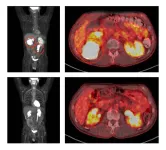(Press-News.org) A new paper in Biology Methods & Protocols, published by Oxford University Press, indicates that it may soon be possible for doctors to use artificial intelligence (AI) to detect and diagnose cancer in patients, allowing for earlier treatment. Cancer remains one of the most challenging human diseases, with over 19 million cases and 10 million deaths annually. The evolutionary nature of cancer makes it difficult to treat late-stage tumours.
Genetic information is encoded in DNA by patterns of the four bases—denoted by A, T, G and C—that make up its structure. Environmental changes outside the cell can cause some DNA bases to be modified by adding a methyl group. This process is called “DNA methylation.” Each individual cell possesses millions of these DNA methylation marks. Researchers have observed changes to these marks in early cancer development; they could assist in early diagnosis of cancer. It’s possible to examine which bases in DNA are methylated in cancers and to what extent, compared to healthy tissue. Identifying the specific DNA methylation signatures indicative of different cancer types is akin to searching for a needle in a haystack. This is where the researchers involved in this study believe that AI can help.
Investigators from Cambridge University and Imperial College London trained an AI mode, using a combination of machine and deep learning, to look at the DNA methylation patterns and identify 13 different cancer types (including breast, liver, lung, and prostate cancers) from non-cancerous tissue with 98.2% accuracy. This model relies on tissue samples (not DNA fragments in blood) and would need additional training and testing on a more diverse collection of biopsy samples to be ready for clinical use. The researchers here believe that an important aspect of this study was the use of an explainable and interpretable core AI model, which provided insights into the reasoning behind its predictions. The researchers explored the inner workings of their model and showed that the model reinforces and enhances understanding of the underlying processes contributing to cancer.
Identifying these unusual methylation patterns (potentially from biopsies) would allow health care providers to detect cancer early. This could potentially improve patient outcomes dramatically, as most cancers are treatable or curable if detected early enough.
“Computational methods such as this model, through better training on more varied data and rigorous testing in the clinic, will eventually provide AI models that can help doctors with early detection and screening of cancers,” said the paper’s lead author, Shamith Samarajiwa. “This will provide better patient outcomes.”
The paper, “Early detection and diagnosis of cancer with interpretable machine learning to uncover cancer-specific DNA methylation patterns,” is available (on June 20th) at https://doi.org/10.1093/biomethods/bpae028.
Direct correspondence to:
Shamith Samarajiwa
Department of Metabolism, Digestion and Reproduction, Faculty of Medicine,
Imperial College London
Du Cane Road
London W12 0NN, UNITED KINGDOM
s.samarajiwa@imperial.ac.uk
To request a copy of the study, please contact:
Daniel Luzer
daniel.luzer@oup.com
END
We may soon be able to detect cancer with AI
2024-06-20
ELSE PRESS RELEASES FROM THIS DATE:
Rate of cannabis use disorder during pregnancy increased over 20% after cannabis legalization in Canada
2024-06-20
In October 2018, Canada enacted the Cannabis Act in Canada (CAC), which legalised the non-medical use of cannabis. A new study has found that the rate of cannabis-related disorders diagnosed among pregnant women in the Canadian province of Québec increased by more than 20% after the enactment of the CAC, while rates for all other drug- and alcohol-related disorders remained stable. The study is published today in the scientific journal Addiction.
This study measured changes to the monthly rates of diagnosed cannabis-related disorders (CRDs) in the pregnant population in Québec. Since 2010 the monthly average number of CRDs has increased consistently, ...
Among cancer survivors, LGBTQ+ individuals report higher prevalence of chronic health conditions, disabilities, other limitations
2024-06-20
Bottom Line: Cancer survivors who identify as lesbian, gay, bisexual, transgender, queer, or anything other than straight and cisgender (LGBTQ+) experience more chronic health conditions, disabilities, and other physical and cognitive limitations than non-LGBTQ+ cancer survivors; however, the prevalence of most conditions was highest among transgender or gender non-conforming (TGNC) individuals.
Journal in Which the Study was Published: Cancer Epidemiology, Biomarkers & Prevention, a journal of ...
Improving crops with laser beams and 3D printing
2024-06-20
A demonstration of how new technologies can be used in 21st century crop breeding comes from just published research that combines Laser Scanning and 3D printing to create a detailed 3D model of a sugar beet plant. Taking the next step beyond having genetic information to guide intelligent breeding, the 3D plant models here capture the essential characteristics of the above-ground parts of the sugar beet plant and can be used for AI-assisted crop improvement pipelines. The sugar beet plant models are reproducible and fit for field use. All the research information, data, methodology, as well as the 3D printing files are freely ...
Government’s failure to fortify all flour and rice with sufficient folic acid will lead to avoidable birth defects, warns expert
2024-06-20
The UK government’s failure to fortify all flour and rice with the vitamin folic acid “will result in more deaths and birth defects every year that could have been prevented,” argues Professor Sir Nicholas Wald in The BMJ today.
He warns that the current government’s proposal to fortify only one type of flour (non-wholemeal wheat flour) at an inadequate level will prevent only about 20% of neural tube defects, much less than the approximate 80% that could be prevented with fully effective fortification.
“What the government has done is a useful ...
Walking brings huge benefits for low back pain, study finds
2024-06-20
Adults with a history of low back pain went nearly twice as long without a recurrence of their back pain if they walked regularly, a world-first study has found.
About 800 million people worldwide have low back pain, and it is a leading cause of disability and reduced quality of life.
Repeated episodes of low back pain are also very common, with seven in 10 people who recover from an episode going on to have a recurrence within a year.
Current best practice for back pain management and prevention suggests the combination of ...
Study finds one copy of protective genetic variant helps stave off early-onset Alzheimer’s disease
2024-06-19
KEY TAKEAWAYS
An international team, including researchers from Mass General Brigham, has been searching for protective genetic variants in a family that includes more than 1,000 individuals who are genetically predisposed to develop early onset Alzheimer’s disease in their 40s.
Previously, the researchers identified the “Christchurch variant” as potentially protective against Alzheimer’s based on one family member who had two copies of this variant and was expected to develop dementia in her ...
Combination targeted treatment produces lasting remissions in people with resistant aggressive B-cell lymphoma
2024-06-19
Embargoed for Release
Wednesday, June 19, 2024
5:00 p.m. ET Contact: NCI Press Office
240-760-6600
NCIPressOfficers@nih.gov
NOTE: A virtual briefing is scheduled for Tuesday, June 18, 2024, at 1:00 p.m. ET. Details below.
Researchers at the National Institutes of Health (NIH) have developed a non-chemotherapy treatment regimen that is achieving full remissions for some people with aggressive B-cell lymphoma that has come back or is no longer responding to standard treatments. The five-drug combination targets multiple molecular pathways that diffuse large B-cell lymphoma (DLBCL) tumors use to survive.
In ...
Common prostate drugs tied to lower risk of dementia with lewy bodies
2024-06-19
EMBARGOED FOR RELEASE UNTIL 4 P.M. ET, WEDNESDAY, JUNE 19, 2024
MINNEAPOLIS – Certain drugs used to treat urinary symptoms due to an enlarged prostate may be associated with a reduced risk of dementia with Lewy bodies, according to a study published in the June 19, 2024, online issue of Neurology®, the medical journal of the American Academy of Neurology. Dementia with Lewy bodies is a progressive neurodegenerative disorder that can cause memory and thinking issues, movement problems and issues such as hallucinations.
The results do not prove that these drugs reduce the risk of dementia ...
Drugs for enlarged prostate may also protect against dementia with Lewy bodies
2024-06-19
A new study suggests that certain drugs commonly used to treat enlarged prostate may also decrease the risk for dementia with Lewy bodies (DLB). This observational finding may seem surprising, but it mirrors previous work by the University of Iowa Health Care team that links the drugs to a protective effect in another neurodegenerative condition–Parkinson's disease.
The UI researchers think that a specific side effect of the drugs targets a biological flaw shared by DLB and Parkinson’s disease, as well as other neurodegenerative ...
Titan’s lakes may be shaped by waves
2024-06-19
Titan, Saturn’s largest moon, is the only other planetary body in the solar system that currently hosts active rivers, lakes, and seas. These otherworldly river systems are thought to be filled with liquid methane and ethane that flows into wide lakes and seas, some as large as the Great Lakes on Earth.
The existence of Titan’s large seas and smaller lakes was confirmed in 2007, with images taken by NASA’s Cassini spacecraft. Since then, scientists have pored over those and other images for clues to the moon’s mysterious ...



